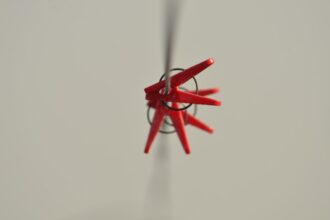Admiral Hyman G. Rickover, often referred to as the “Father of the Nuclear Navy,” left an indelible mark on the United States Navy and the broader field of military operations.
Rickover’s legacy is not merely confined to the development of nuclear submarines; it extends to the very ethos of military leadership and accountability. He championed a culture where quality was not just an objective but a fundamental principle that guided every decision and action within the Navy. Rickover’s influence can be seen in the rigorous training programs he established, which emphasized technical proficiency and ethical responsibility.
He believed that a well-trained officer corps was essential for maintaining high standards in naval operations. His insistence on thorough inspections and quality control measures ensured that every component of the nuclear fleet met stringent safety and performance criteria. This legacy continues to resonate within the Navy and serves as a benchmark for quality assurance in military operations worldwide.
Key Takeaways
- Admiral Hyman G. Rickover’s legacy is marked by his relentless pursuit of quality in military operations and nuclear power.
- Quality is not just a goal, but a strategic advantage that can give military forces an edge in warfare.
- The importance of quality in military operations cannot be overstated, as it directly impacts the effectiveness and success of missions.
- Rickover’s leadership had a profound influence on the prioritization of quality in military systems and operations.
- Implementing quality in military systems is crucial for ensuring reliability, safety, and effectiveness in national defense.
In the realm of military operations, quality serves as a strategic advantage that can determine the outcome of conflicts. A focus on quality ensures that military forces are not only equipped with advanced technology but also possess the training and discipline necessary to utilize these tools effectively. High-quality systems and personnel can adapt to rapidly changing battlefield conditions, making them more resilient in the face of adversity.
This adaptability is crucial in modern warfare, where the speed of information and the complexity of threats require a level of operational excellence that can only be achieved through a commitment to quality. Moreover, quality in military operations fosters trust among allies and deters adversaries. When a nation demonstrates its capability through high-quality military assets and well-trained personnel, it sends a clear message about its readiness to defend its interests.
This perception of strength can dissuade potential aggressors from engaging in conflict, thereby enhancing national security. In this context, quality becomes not just a measure of performance but a vital component of strategic deterrence.
The Importance of Quality in Military Operations
Quality is paramount in military operations, where the stakes are often life and death. The effectiveness of any military campaign hinges on the reliability of equipment, the competence of personnel, and the integrity of command structures. High-quality training programs ensure that service members are prepared for the challenges they will face, while robust maintenance protocols guarantee that equipment functions as intended under pressure.
In an environment where failure can have catastrophic consequences, prioritizing quality is not merely advisable; it is essential. Furthermore, the importance of quality extends beyond immediate operational effectiveness. It influences morale, cohesion, and trust within military units.
When service members know they are equipped with reliable tools and supported by competent leadership, their confidence in their mission increases. This sense of assurance can enhance performance on the battlefield, leading to more successful outcomes. Thus, quality is not just a technical requirement; it is a critical factor in fostering a culture of excellence within military organizations.
The Influence of Rickover’s Leadership on Quality

Admiral Rickover’s leadership style was instrumental in instilling a culture of quality within the Navy. He was known for his hands-on approach and his insistence on accountability at all levels. Rickover believed that leaders must take personal responsibility for the quality of their operations and that this accountability should extend throughout the ranks.
His leadership philosophy emphasized that every individual, from the highest-ranking officer to the newest recruit, played a role in maintaining standards. Rickover’s influence also extended to his insistence on rigorous training and education for naval personnel. He understood that knowledge was power and that well-informed service members were better equipped to make sound decisions under pressure.
By prioritizing education and technical expertise, Rickover ensured that the Navy’s workforce was not only capable but also committed to upholding high standards of quality in all aspects of their duties.
Implementing Quality in Military Systems
| Metrics | 2018 | 2019 | 2020 |
|---|---|---|---|
| Defect Density | 0.05 | 0.04 | 0.03 |
| Customer Satisfaction | 85% | 88% | 90% |
| On-time Delivery | 92% | 95% | 97% |
Implementing quality in military systems requires a comprehensive approach that encompasses design, production, testing, and maintenance. It begins with establishing clear standards and expectations for performance at every stage of a system’s lifecycle. This process involves collaboration among engineers, operators, and maintenance personnel to ensure that all aspects of a system are aligned with quality objectives.
By fostering an environment where feedback is encouraged and lessons learned are integrated into future designs, military organizations can continuously improve their systems. Moreover, effective implementation of quality requires robust oversight mechanisms to monitor compliance with established standards. Regular inspections, audits, and evaluations help identify areas for improvement and ensure that any deficiencies are addressed promptly.
This proactive approach not only enhances operational readiness but also builds confidence among service members who rely on their equipment to perform effectively in high-stakes situations.
The Role of Quality in National Security
Quality plays a pivotal role in national security by ensuring that military forces are prepared to respond effectively to threats. A well-equipped and well-trained military can deter aggression and project power when necessary, safeguarding national interests both at home and abroad. In an era characterized by complex geopolitical challenges, maintaining high standards of quality is essential for ensuring that military forces can adapt to evolving threats and operate seamlessly across diverse environments.
Additionally, quality contributes to international partnerships and alliances. Nations with high-quality military capabilities are often viewed as reliable allies, fostering trust and cooperation among partners. This interconnectedness enhances collective security efforts and strengthens global stability.
As such, investing in quality is not only a matter of national defense but also a strategic imperative for fostering international relationships that contribute to peace and security.
Rickover’s Impact on Nuclear Power and Quality Assurance

Admiral Rickover’s contributions to nuclear power extended beyond the Navy; they had far-reaching implications for energy production and safety standards worldwide. His insistence on rigorous quality assurance protocols set a precedent for nuclear power plants across the globe. By emphasizing safety and reliability in nuclear technology, Rickover helped shape an industry that prioritizes public safety while harnessing the potential of atomic energy.
The principles established by Rickover regarding quality assurance have become foundational in various sectors beyond defense. Industries such as aerospace, manufacturing, and healthcare have adopted similar standards to ensure safety and reliability in their operations. This cross-pollination of ideas underscores Rickover’s lasting impact on quality assurance practices across multiple domains, demonstrating how his legacy continues to influence contemporary approaches to risk management and operational excellence.
Quality as a Deterrent in Warfare
Quality serves as a powerful deterrent in warfare by projecting strength and capability to potential adversaries. When a nation invests in high-quality military assets—be it advanced weaponry or highly trained personnel—it sends a clear signal about its readiness to defend its interests. This perception can dissuade adversaries from engaging in aggressive actions, as they recognize the potential costs associated with confronting a well-prepared opponent.
Moreover, quality enhances operational effectiveness during conflicts, allowing forces to achieve objectives more efficiently and with fewer casualties. A military that prioritizes quality is better equipped to execute complex maneuvers, adapt to changing circumstances on the battlefield, and maintain cohesion among its units. This operational superiority not only increases the likelihood of success but also reinforces deterrence by demonstrating an unwavering commitment to excellence.
The Economic and Political Implications of Quality in Defense
The economic implications of prioritizing quality in defense are significant. High-quality military systems often require substantial investment upfront; however, they yield long-term savings by reducing maintenance costs and enhancing operational efficiency. Additionally, nations that prioritize quality are better positioned to attract foreign investment and foster partnerships with allied nations seeking reliable defense capabilities.
Politically, a commitment to quality can enhance a nation’s standing on the global stage. Countries known for their high-quality military forces are often viewed as leaders in defense innovation and reliability. This reputation can translate into increased diplomatic leverage when negotiating alliances or addressing security challenges.
Thus, investing in quality not only strengthens national defense but also bolsters a nation’s political capital in international relations.
Quality as a Force Multiplier in Military Operations
Quality acts as a force multiplier in military operations by enhancing the effectiveness of existing resources. A well-trained unit equipped with high-quality technology can achieve objectives that would be unattainable for less capable forces. This amplification effect allows militaries to operate more efficiently while maximizing their impact on the battlefield.
Furthermore, quality fosters innovation within military organizations. When service members are encouraged to pursue excellence, they are more likely to develop creative solutions to complex problems. This culture of innovation can lead to breakthroughs in tactics, strategies, and technologies that further enhance operational effectiveness.
In this way, prioritizing quality not only improves current capabilities but also paves the way for future advancements.
Lessons from Rickover’s Approach to Quality in Warfare
Admiral Rickover’s approach to quality offers valuable lessons for contemporary military leaders seeking to enhance operational effectiveness. His unwavering commitment to accountability serves as a reminder that leadership must prioritize standards at all levels within an organization. By fostering a culture where every individual understands their role in maintaining quality, leaders can create an environment conducive to excellence.
Additionally, Rickover’s emphasis on education underscores the importance of continuous learning within military organizations. In an era characterized by rapid technological advancements and evolving threats, investing in training and professional development is essential for maintaining high standards of performance. By embracing these lessons from Rickover’s legacy, modern militaries can cultivate a culture of quality that enhances their readiness and effectiveness on the global stage.
In conclusion, Admiral Hyman G. Rickover’s legacy continues to shape military operations through his unwavering commitment to quality as a strategic advantage. His influence extends beyond naval engineering into broader discussions about national security, deterrence, and operational excellence.
By prioritizing quality at every level—from training personnel to implementing robust systems—military organizations can enhance their effectiveness while fostering trust among allies and deterring potential adversaries. The lessons learned from Rickover’s approach remain relevant today as militaries navigate an increasingly complex global landscape where quality is paramount for success.
Admiral Hyman G. Rickover, often referred to as the “Father of the Nuclear Navy,” was a staunch advocate for the philosophy that quality is a weapon. His belief was that meticulous attention to detail and an unwavering commitment to excellence were crucial in maintaining a competitive edge, particularly in military operations. This philosophy is echoed in various modern discussions about strategic management and operational efficiency. An article that delves into similar themes of quality and strategic advantage can be found on the War Room website. For more insights, you can read the related article on In the War Room, which explores how quality and precision continue to serve as pivotal elements in contemporary military and business strategies.
WATCH THIS! America’s Nuclear Navy Was Born From Espionage
FAQs
Who is Rickover and what is his “quality as a weapon” philosophy?
Admiral Hyman G. Rickover was a prominent figure in the United States Navy, known as the “Father of the Nuclear Navy.” His “quality as a weapon” philosophy emphasized the importance of maintaining high standards of quality and excellence in the design, construction, and operation of nuclear-powered ships and submarines.
What are the key principles of Rickover’s “quality as a weapon” philosophy?
Rickover’s philosophy focused on rigorous attention to detail, strict adherence to safety protocols, and a commitment to continuous improvement. He believed that superior quality and reliability were essential for maintaining a technological edge and ensuring the effectiveness of the Navy’s nuclear fleet.
How did Rickover’s philosophy impact the U.S. Navy?
Rickover’s emphasis on quality and safety had a profound impact on the U.S. Navy, leading to the development of highly advanced and reliable nuclear-powered vessels. His philosophy also influenced the broader culture of the Navy, promoting a mindset of excellence and accountability in all aspects of naval operations.
What is the legacy of Rickover’s “quality as a weapon” philosophy?
Rickover’s philosophy continues to shape the culture of the U.S. Navy and has had a lasting impact on the field of nuclear engineering and naval technology. His commitment to quality and safety has set a standard for excellence that continues to be upheld in the Navy’s nuclear programs.




